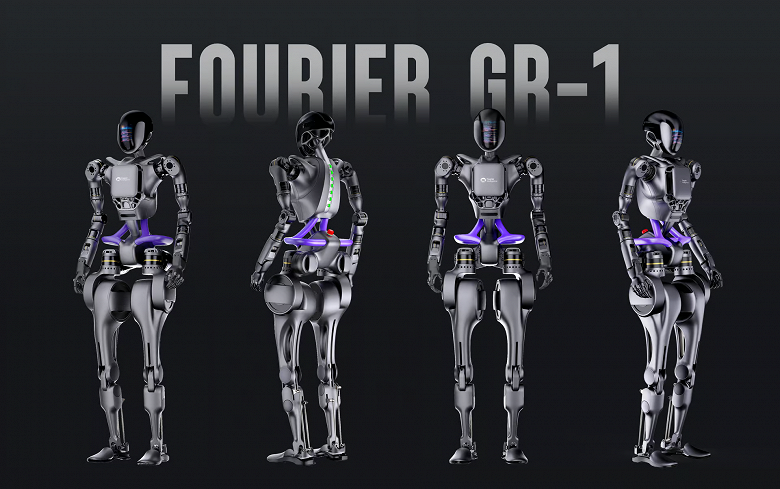
Humanoid robot Fourier GR-1 has been introduced: What is it for?
Fourier Intelligence, a Chinese company specializing in rehabilitation technologies, has announced its ambitious plan to manufacture 100 of its GR-1 general-purpose humanoid robots by the end of 2023. What sets the GR-1 apart is its ability to carry nearly its own weight, making it a promising candidate for caregiving and physical therapy assistance.
With its flagship product, the RehabHub platform, Fourier Intelligence offers a range of integrated physical therapy devices designed to address various issues. From wrist strength games to hand and finger grip training, and even lower-body exoskeletons for mobility training, the company is at the forefront of innovative rehabilitation solutions.
Although the GR-1 humanoid project may seem unexpected from a company primarily focused on rehabilitation, there are significant overlaps in technology and problem-solving between lower-body exoskeletons and humanoid robots. Moreover, China's demographic challenges, exemplified by an imbalanced population pyramid, create a pressing need for alternative solutions as the elderly population grows faster than the working-age population.

By developing versatile humanoid robots like the GR-1, Fourier Intelligence aims to alleviate the burden on the workforce by automating various tasks. The company envisions the GR-1 as a general-purpose robot that can be used in caregiving and physical therapy settings. Notably, the robot's design features grip handles around its hips, resembling those found in rehabilitation centers.
The GR-1 stands at a height of 165 cm (5 ft 5 in) and weighs 55 kg (121 lb), with a top walking speed of 5 km/h (3 mph). Its joints, similar to other advanced robots like those developed by Tesla and Figure, utilize electric actuators to provide 40 degrees of freedom. Unlike hydraulic systems employed in robots such as Boston Dynamics' Atlas, the GR-1 relies on powerful electric motors, with the largest one generating up to 300 Nm (221 lb-ft) of torque.
With its impressive capabilities, the GR-1 is expected to have a carrying capacity of 50 kg (110 lb), nearly its own weight, surpassing the current state-of-the-art in humanoid robots represented by Atlas. Fourier Intelligence asserts that the GR-1 could be employed in tasks such as transporting immobile patients between beds and wheelchairs, serving as a caregiver, or providing therapy assistance.
Zen Koh, the CEO and co-founder of Fourier Intelligence, expressed his vision for the GR-1, stating, "The system itself can achieve self-balance walking and perform different tasks. We can program it to sit, stand, and jump. You can program the arms to pick up utensils and tools and perform tasks as the engineers desire."
Since 2021, Fourier Intelligence has been working on various partial and full-body prototypes, refining the hardware and software. In a demonstration video, the GR-1 can be seen walking, handling objects delicately, responding to human interaction, and navigating obstacles. Although the footage appears to be sped up, Fourier Intelligence has made significant strides in achieving the necessary sophistication to compete in the emerging general-purpose humanoid market.
However, the true challenge lies in teaching these robots to autonomously navigate and perform tasks in complex and unfamiliar environments. Recognizing this, Fourier Intelligence aims to accelerate progress by adopting an open approach. They plan to ship the initial 100 GR-1 units, which will serve as hardware/software platforms with basic capabilities, to research and development laboratories. This strategy encourages diverse and complementary techniques from different robotics teams to enhance the GR-1's intelligence and functionality.
The success of Fourier Intelligence's hyper-collaborative approach remains to be seen, but it holds the potential to propel the GR-1 to new heights in usefulness. As the world grapples with an impending shortage of human caregivers for aging populations, companies like Fourier Intelligence may offer a solution through capable, responsive, and friendly humanoid robots. However, it is unlikely that Chinese-built humanoids will be deployed on American soil in the near future.
- Related News
- Artificial intelligence can recognize human emotions by voice: Where can it be used?
- Eight major newspapers sue OpenAI and Microsoft for illegally using their content for AI development
- Chinese startup introduces robot that prepares, serves, pours wine, irons, and folds ironed clothes
- Google's Gemini app is already available for older versions of Android
- Google fires 28 employees who protested against company's cooperation with Israel
- Meta unveils Llama 3 and claims it's the "most powerful" open source language model
- Most read
month
week
day
- Xiaomi unveils exclusive Redmi Note 13 Pro+ dedicated to Messi and Argentina national team 980
- Internet 500 times faster than 5G tested in Japan: It allows to transfer five movies in HD resolution in one second 828
- Which smartphones will be the first to receive Android 15? 743
- What will happen to the Earth if the Moon disappears? 742
- iPhone 16 may get colored matte glass back panel, 7 colors 719
- Great value for money: 3 best Realme smartphones 707
- WhatsApp receives two new features 673
- Why it is recommended to download applications on trusted platforms: In 2023, Google rejected publication of more than 2 million dangerous applications on Google Play 619
- Instagram is changing its approach to content recommendations: How will the application help promote original content and fight reposters? 590
- How to realize that your smartphone is hacked and you are being surveilled? 560
- Archive
